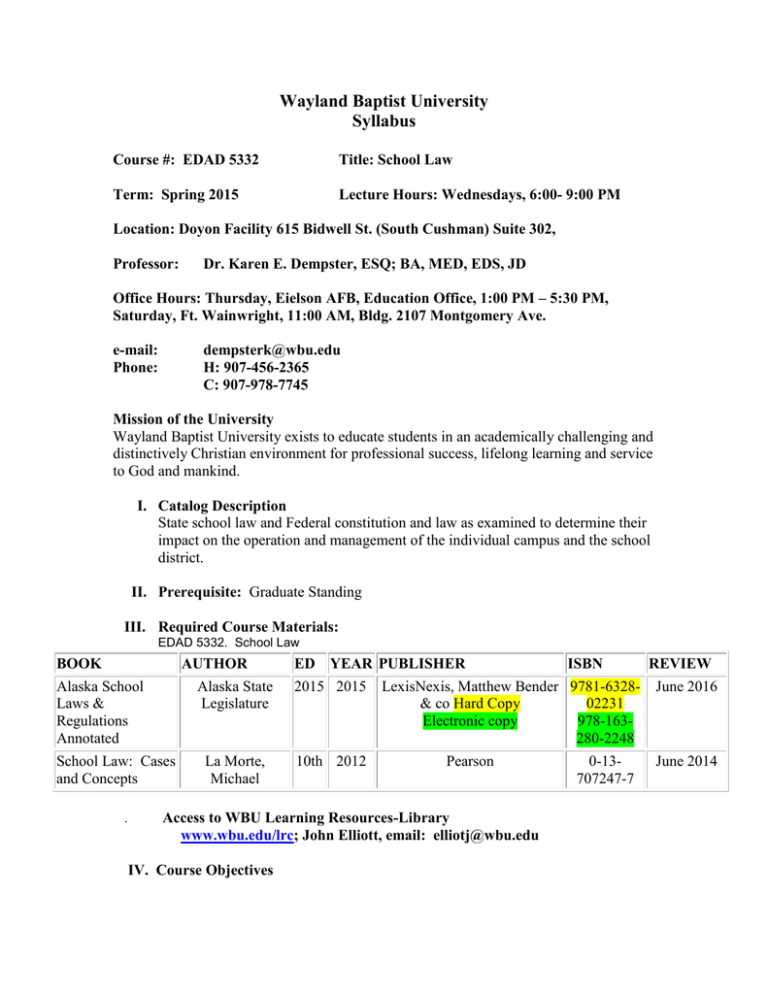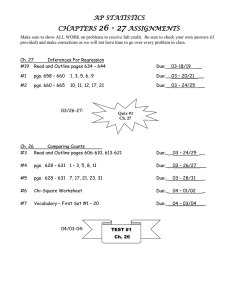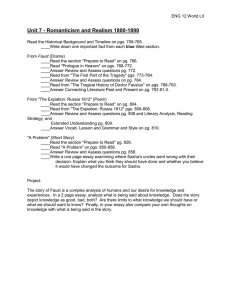Wayland Baptist University Syllabus
advertisement

Wayland Baptist University Syllabus Course #: EDAD 5332 Title: School Law Term: Spring 2015 Lecture Hours: Wednesdays, 6:00- 9:00 PM Location: Doyon Facility 615 Bidwell St. (South Cushman) Suite 302, Professor: Dr. Karen E. Dempster, ESQ; BA, MED, EDS, JD Office Hours: Thursday, Eielson AFB, Education Office, 1:00 PM – 5:30 PM, Saturday, Ft. Wainwright, 11:00 AM, Bldg. 2107 Montgomery Ave. e-mail: Phone: dempsterk@wbu.edu H: 907-456-2365 C: 907-978-7745 Mission of the University Wayland Baptist University exists to educate students in an academically challenging and distinctively Christian environment for professional success, lifelong learning and service to God and mankind. I. Catalog Description State school law and Federal constitution and law as examined to determine their impact on the operation and management of the individual campus and the school district. II. Prerequisite: Graduate Standing III. Required Course Materials: EDAD 5332. School Law BOOK AUTHOR Alaska School Laws & Regulations Annotated School Law: Cases and Concepts . ED YEAR PUBLISHER Alaska State Legislature 2015 2015 La Morte, Michael 10th 2012 LexisNexis, Matthew Bender 9781-6328& co Hard Copy 02231 Electronic copy 978-163280-2248 Pearson Access to WBU Learning Resources-Library www.wbu.edu/lrc; John Elliott, email: elliotj@wbu.edu IV. Course Objectives ISBN 0-13707247-7 REVIEW June 2016 June 2014 Students will: Identify and explain major issues in School Law. Use a case study approach to gain a working knowledge of legal principles. Explain court cases impacting classroom instruction and administrative procedures. Examine rights of students, parents, employees, and school boards. Demonstrate knowledge of the legal framework at the local, state, and federal level which impacts education today. Translate board policies as well as administrative regulations and/or directives into on-the-job requirements. Have the legal knowledge to “stay out of trouble”! V. Content Outline I. Educational Governance: A. Sources of Law B. The American Judicial System C. US constitution and Federal government impact on Texas D. Parent Rights II. Student Attendance and t he Instructional Program A. Compulsory Attendance B. Safe School Environment C. The Instructional Program D. Extracurricular Activities and the UIL E. Special Groups III. Special Education A. Federal Legislation B. Discipline of Students with Disabilities C. Section 504 of the rehabilitation Act of 1973 IV. Employment Relationship A. Constitutional Issues B. Type of Employment Arrangements C. Selection of Staff D. Ending of the Relationship V. Personnel Issues A. Reassignment B. Compensation Disputes C. Teacher Appraisal D. Employment Benefits E. Grievances and the Role of Employee Organizations VI. Expressions and Associational Rights A. Educator Rights of Expression and Association B. Student Rights of Expression and Association VII. Religion in the Schools A. Legal Framework B. Contemporary Issues C. Religion in Classrooms D. Student religious groups and the equal access act VIII. Student Discipline A. Guidelines for Rule Making B. Due Process C. Chapter 37 TAC IX. Privacy Issues: Community, Educators and Students A. Legal Framework B. Educator Privacy Rights C. Student Privacy Rights D. Student Search and Seizure X. Legal Liability A. State Torts B. Federal Civil Rights Liability III. Course Requirements Attendance and participation in class Read assigned text/sources and answer short essay questions on blackboard. Read the model answers and ask Dr. Dempster on the feedback, if needed. Critique assigned law cases. Each critique should consist of a one paragraph summary of the article, and a one paragraph reaction to the article. Students are expected to interview one principal/superintendent designee, identifying two or three most difficult legal problems he/she faces regularly. A short summary of the interview is required(as the Mid-term exam). Prepare and present a briefing paper that is designed to inform a superintendent/principal or faculty as in-service education, on a legal issue covered in this course. The topic for the paper must be approved by the professor (this will be your final exam). Mid-term and final exam will consist of the interview and the “briefing paper above. The discussion board is also graded. IV. Attendance University Policy: A. All ‘absences’ must be explained to the instructor in writing who will then decide whether the work missed may be made up. B. Any student who misses 25% of scheduled class activities will receive an F. C. For every week of ‘ absence’ (or the equivalent in on-line courses) the student’s grade may be lowered one letter. Call me if you run into problems. D. Other policies as they are published are considered to be part of this syllabus. E. When a student reaches what the instructor considers to be excessive inactivity, the student will be advised and the Division Chair will be notified. F. A student may petition the Academic Council for exceptions to the above stated policies. V. Evaluation A. Responses to real life short essay questions at 5-10 points each B. Principal Interview C. Presentation project (Briefing Paper) D. Participation/Discussion board 200-400 100 100 50-100 Total points will be converted to a letter grade as follows: Points earned divided by total points possible, the percentage is assigned a grade as follows A= (90-100%) B= (80-89%) C= (70-79%) D= (60-69%) F= (0-59%) Cr For Credit NCR No Credit I Incomplete** W for Withdrawal X No Grade Given IP In Progress ** A grade of incomplete is changed if the deficiency is made up by the end of the next regular semester, otherwise, it becomes “F”. This grade is given only if circumstances beyond the student’s control prevented completion of work during the semester enrolled and attendance requirements have been met. A grade of “CR” indicates that credit in semester hours was granted but no grade or grade points were recorded. IX. Course Outcome Expectations Describes the role of education in a democratic society within an historical context Develops procedures for defining mutual expectations Develops strategies for formulating and implementing organizational policy and funding practices Adjust and aligns policy to state and federal requirements Develops procedures to provide equal educational opportunities in programs Applies strategies addressing international issues that affect teaching and learning Identifies the potential legal issues affecting school personnel selection, development, supervision, retention and dismissal Implements policies and procedures that promote professional educator compliance with the code of ethics and standard practices for educators. Implements effective, appropriate and legal strategies for the recruitment, screening and selection, assignment, induction, development, evaluation, promotion, discipline and dismissal of campus staff Apply laws and policies to ensure sound financial management in relation to accounts, bidding, purchasing and grants Apply local, state, and federal laws and policies to support sound decision making related to school programs and operations X. ADA statement “It is the university policy that no otherwise qualified disabled person be excluded from participation in, be denied the benefits of or be subject to discrimination under any educational program or activity in the university”. XI. Methods of Instruction 1. Legal concepts, laws and constitution will be presented through BlackBoard and Discussion Board, external links and course documents. 2. Candidates will interview a principal to determine major legal issues encountered. The student will summarize the interview and present in writing and on Blackboard, the knowledge gained from the interview. 3. The candidate will research an area of the law and significant cases relating to the legal point and provide a legal brief to me through essay question in Course Content folder for this week (11). This is the briefing paper you would prepare for your principal/superintendent XII. Calendar Read Chapters in the two texts that deal with the topic for the week Participate in discussion board based on the reading. ASSIGNMENTS, WEEK BY WEEK Your assignments are ‘due’ the next Wednesday. Week 1 – Feb 25, 2015 Read Pgs. 1- 16 A. Sources of Law B. The American Judicial System C. US constitution and Federal government impact on Schools D. The American Judicial System What is your school’s procedure for handling emergency situations Week 2 – March 4, 2015 Read Pgs. 17 - 51 A. Compulsory Attendance B. Public Schools/Private Schools/Home Schooling C. The Instructional Program/ Admission Issues D. Religion in the Schools Answer short essay questions on real life situations Week 3 – March 11, 2015 Read Pgs. 51 - 85 A. Equal Access B. Teaching of Evolution C. Textbooks/Religion D. Use of Facilities, Aide to nonpublic schools, Fees & Health Services Answer short essay questions on real life situations Spring Break March 15 – March 20, 2015 Week 4 - March 25, 2015 Read Pgs. 85 -124 A. Constitutional Issues/ Expression B. Family Educational Rights and Privacy Act 1974 C. Suspension, Expulsion, and Disciplinary Transfer Answer short essay questions on real life situations Week 5 – April 1, 2015 (April Fools) Read Pgs. 124 - 157 A. Corporal Punishment B. Search of Students and Lockers C. Student Appearance D. Pregnancy, Parenthood, and Marriage E. Participation in Extracurricular Activities F. School Punishment for Out-of-School Offenses Answer short essay questions on real life situations Week 6 – April 8, 2015 Read Pgs. 158 - 228 A. Nonrenewal and Dismissal B. Freedom of expression/Academic Freedom C. Drug testing D. Personal Appearance E. Teacher as exemplar F. Employment Discrimination G. Teacher Bargaining & Political Activities Students are expected to interview one principal/superintendent designee, identifying two or three most difficult legal problems he/she faces regularly. A short summary of the interview is required(as the Mid-term exam) Week 7 – April 15, 2015 2015 Read Pgs. 229 - 253 A. Historical Perspective B. Desegregation in the Non-Southern States C. Recent Desegregation Issues D. Epilogue Answer short essay questions on real life situations Week 8 – April 22, 2015 Read Pgs. 254-286 A. IDEA B. Sec 504, of Rehabilitation Act C. ADA Develop a “Cheat Sheet” on Sp. Ed Laws for yourself and for any in-service activity you might lead. Week 9 – April 29, 2015 Read Pgs. 287-325 A. School Finance Reform B. Choice financial impact Answer short essay questions on real life situations Week 10 –May 6, 2015 2015 Read Pages 326-352 A. General Principles Underlying Educator Liability B. Liability under State Law C. Liability under Federal Law D. Parental Consent E. Malpractice F. Insurance Prepare and present a briefing paper that is designed to inform a superintendent/principal or faculty as in-service education, on a legal issue covered in this course. The topic for the paper must be approved by the professor (this will be your final exam). Week 11 – May 13-13, 2015 Present your briefing paper to the class. Pizza and banquet party.




